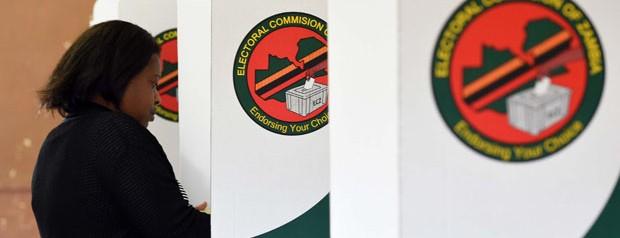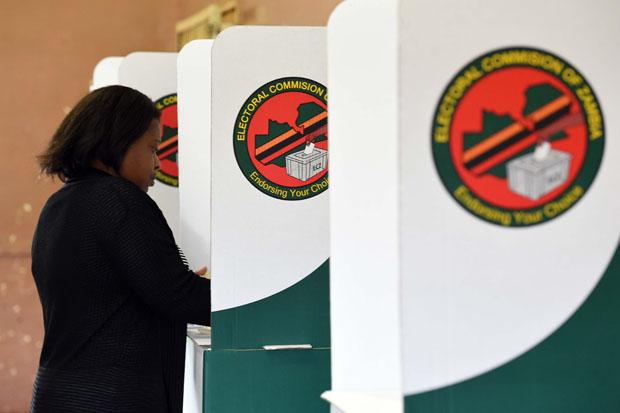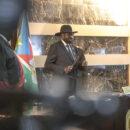The president could be only the second most important thing Zambians vote on tomorrow

The draft constitution has lacked attention and scrutiny. Far from curbing executive powers, the new charter could extend them.

Zambians vote in the elections last year. Credit: DIRCO.
As Zambians prepare to go to the polls tomorrow, on 11 August, the bulk of coverage has focused on the race for the presidency and on parliamentary contests. But as they cast their ballots, voters will also get to decide on an issue that could have consequences that reach well beyond the next electoral cycle: an amended constitution and bill of rights.
These issues have received relatively little scrutiny and been largely subsumed by party campaigning. And because of this, Zambians, in their haste, may unwittingly end up exacerbating rather than solving a problem that has plagued the country since independence – namely, an overly powerful executive.
[See: Zambia gears up for unsettlingly close elections]
Changing the rules
Amending the constitution has long been an arena of protest and contestation between the state and non-state actors in Zambia. The inherited Lancaster House constitution has been repeatedly amended but never entirely replaced, leaving Zambia with a founding charter that entrenches a strong executive presidency, lacks of a progressive bill of rights, and still contains some repressive colonial-era provisions.
Because of this, there had already been six attempts at changing or reviewing the constitution over the past 40 years when President Edgar Lungu brought in the Constitutional Amendment Act after coming to power in January 2015.
In January 2016, facing popular pressure, Lungu signed some of the constitutional amendments regarding electoral rules into law. This move was partly done to lend the government legitimacy in the eyes of international donors as well as to avoid civil society and the opposition being able to attack the party for failing to deliver on its 2011 promises regarding constitutional changes.
Lungu’s amendment introduced popular revisions to Zambia’s electoral system such as the requirement that the president be elected by a majority of the national vote, with a second round run-off to be held if no single candidate achieves this in the first round.
The amendment also requires presidential candidates to have a running mate, who will become vice-president and assume the top job in event of the incapacitation or death of the president. This was an extremely popular move as the deaths of two sitting presidents – Levy Mwanawasa in 2008 and Michael Sata in 2014 – forced the country into expensive and disruptive unplanned electoral periods. As a result of the presidential by-elections, the 2016 election will be the country’s fifth in just ten years.
Furthermore, Lungu’s constitutional changes also created a new constitutional court which will preside over constitutional issues and – crucially – any electoral challenges.
[See: Zambia’s 2016 elections: is a disputed outcome now inevitable?]
Some concerning changes
These changes to the electoral rules will apply to the upcoming vote. But other parts of the new constitution – such as the bill of rights – cannot be enacted by parliamentary and presidential assent. Instead, they are being put to a referendum.
However, beyond the bill of rights, there has been little interrogation of the amendments which have largely escaped the notice of civic bodies, constitutional experts and the donors who funded considerable parts of the constitution-making exercise. This is particularly worrying given that, amongst other things, the draft looks like it will extend rather than diminish executive powers.
As constitutional law expert Professor Muna Ndulo has pointed out in his analysis of the draft constitution, Article 81 (4) allows that “the President may dissolve Parliament if the Executive cannot effectively govern the Republic due to the failure of the National Assembly to objectively and reasonably carry out its legislative function”. This essentially empowers the executive to make a judgement call about the efficacy of parliament, undermining the principle of the separation of powers.
Furthermore, subsequent articles make the Constitutional Court the final arbiter of the dissolution of parliament, potentially exposing the judiciary to political pressure and further undermining the separation of the three arms of government.
The constitution also seems to entrench presidential power with regards to the judiciary in articles 137, 138 and 140, which are unclear and contradictory on the appointment process of judges, apparently allowing the president to exercise a substantial degree of control over their appointment. This is what happened with the appointment of the six constitutional court judges earlier this year.
There are also a number of other concerning aspects of the draft such as the decision to make the Supreme Court and Constitutional Court rank equivalently, which could mean that contentious cases are bounced back and forth between the two courts as neither has superior jurisdiction to reach a final verdict.
Additionally, the procedure for appointing the electoral commission is left largely unaddressed. This means that in practice, the president is able to appoint members to this crucial body subject to ratification by the National Assembly, a body that provides few checks and balances if the ruling party has a majority.
Yes vs. no
In 2013, over 300 civic bodies and opposition parties in Zambia formed the Grand Coalition on the Constitution to push for the creation and enactment of a new foundational document. But the critical consensus that once existed within civil society on the matter has largely dissipated.
On the eve of the election, the Grand Coalition has issued a statement criticising the decision to hold the referendum alongside the elections, saying “We believe that a standalone referendum outside a partisan charged atmosphere will render more legitimacy to the exercise”.
However, broadly-speaking, many central members of the group support the new constitution. Some key figures of the coalition sat on the constitutional review process’ technical committee and thus endorsed the final draft. Meanwhile, it also appears that donor pressure and an inordinate focus on the bill of rights rather than other important amendments has led to blanket support for the amended constitution from key civic organisations.
In an event convened by the Council of Churches of Zambia (CCZ) on 28 July 2016, law expert Ndulo picked apart the most problematic aspects of the draft, leading one bishop to hang his head and denounce the “brown envelope culture” that had undermined their independence. But while some groups such as the CCZ have taken a more measured and critical view of the new charter, many of the Grand Coalition’s members have been vocal in their support of the draft, if not the referendum.
Will it be passed?
In terms of the campaign, the ruling Patriotic Front has been advocating for ‘yes’, while the opposition has reportedly told their constituents not to mark these ballots at all. This appears to be due to their belief that it will be impossible for the yes campaign to succeed.
In order to pass, the referendum is required to garner the 50%+1 of “eligible” voters, and the electoral commission has reportedly said that there are 7.5 million such individuals. But since the number of eligible voters (as opposed to just registered voters) is impossible to determine without an up-to-date census, this figure can easily be challenged.
If the referendum were deemed to have passed, it is unclear if such a challenge would be launched and by whom. But if it were, it might struggle in the new Constitutional Court. In early March, President Lungu’s appointment of six judges to this court was met with resistance and concern when it was revealed that none met the criteria for appointment to the post and three were known to have close personal links to the president.
Sadly, the 2016 constitutional amendment process seems to have been yet another missed opportunity to create a more progressive founding charter that enshrines critical checks on executive power. Instead, there is a danger that due to a lack of scrutiny and attention, Zambia could in fact vote for a new constitution this Thursday that does the very opposite.
A version of this article was first published on Democracy in Africa.
Nicole Beardsworth is a South African political analyst and doctoral candidate at the University of Warwick.
[See: Copper, poverty and tax dodging: At the heart of Zambia’s high stakes elections]
[See: Hichilema: It’s high time to fix Zambia after 5 years of failed leadership]



